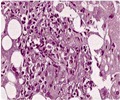Scientists are getting closer to developing a vaccine against kala azar (black fever) - a fatal parasitic infection transmitted by sandflies.

Symptoms of the disease, known as kala azar in India, include fever, weight loss, mucosal ulcers, fatigue, anaemia and substantial swelling of the liver and spleen.
Leishmaniasis affects 12 million people and there are an estimated 1.5 million new cases annually, mainly in India, Bangladesh, Nepal, Sudan, South Sudan, Ethiopia and Brazil, the journal Nature Genetics reports.
Jenefer Blackwell, professor and head of genetics at the Telethon Institute for Child Health Research, University of Western Australia co-authored the study which has uncovered a single major genetic risk factor for visceral leishmaniasis.
Scientists from India, Brazil, Britain, US and Australia, Blackwell identified variation in a specific region of the major immune response locus, known to immunologists as the major histocompatibility complex (MHC), as the single most important genetic risk factor for disease, according to an university statement.
The researchers compared genomes of 1,346 people suffering from disease in India and Brazil against those of 2702 healthy controls.
Advertisement
Teams in Australia, Britain and the US are using the results to study the way the immune system interacts with the disease in mice.
Advertisement
Source-IANS












